Skin
by E.M. Reapy
Elizabeth Reapy’s Natalie is one of those characters who stays with you long after you’ve finished the book she occupies. If “occupies” is even the right word, given Natalie’s preoccupation with not taking up too much space in the world. Fixated on her body and her tendency to binge at times of stress, she takes the reader on a journey – both literal and metaphorical. As she moves through the world, the book begins to resemble a series of linked
short stories more than a novel, but there’s something very fitting about where the chapter breaks tend to fall. The girl we first meet in Bali is very at odds with herself; but by the time she finishes up in Dublin, she is much more comfortable in her own skin, and well able to stand up for herself and articulate her needs and desires. Along the way she meets a host of interesting characters – some interesting, some off-putting – and learns something about herself in the process. Skin is a book to be savored slowly, all the better to appreciate Reapy’s gift for description and character. She joins a wealth of Irish writers hailing from Mayo – in the same illustrious company as Sally Rooney and Mike McCormack, to name but two.
– Darina Molloy
$17 / Head of Zeus Publisher / 304 pages
℘℘℘
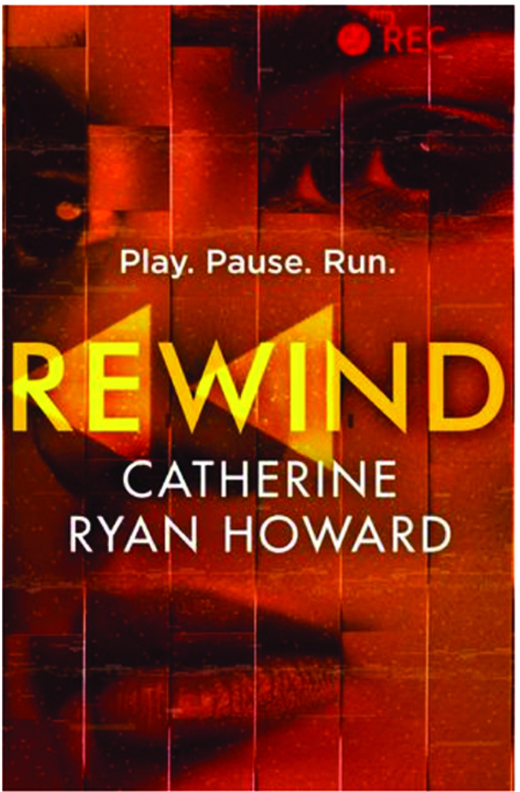
Rewind
by Catherine Ryan Howard
Natalie is an influencer who worries that somebody is trying to tell her something about her husband. When she arrives at the isolated Shanamore Holiday Cottages in Cork, she finds the manager Andrew to be a creep of the highest order. But she has a very good reason for being there and is determined not to leave until she’s found what she’s looking for. There begins the tease – the reader watches Andrew watching his guest on a hidden camera. There is a murder, sudden and brutal. And a journalist who needs to get off her sister’s couch and back on her own two feet. Rewind is full of twists and turns, and they don’t always make sense until the next
piece of the puzzle is revealed. Ultimately, though, the whodunnit (and more importantly, why-they-dunnit) seems an implausible step too far against the backdrop of a most excellent first
half. But, on the whole, Catherine Ryan Howard is a welcome addition to the pantheon of Irish
crime writers. Women writers have definitely made this a genre of their own – with Ryan Howard
in excellent company alongside Jane Casey, Liz Nugent, Claire McGowan, Tana French, Claire
Allan and Dervla McTiernan. It is truly a golden time for Irish crime connoisseurs!
– Darina Molloy
$17 / Blackstone Publishing / 314 pages
℘℘℘
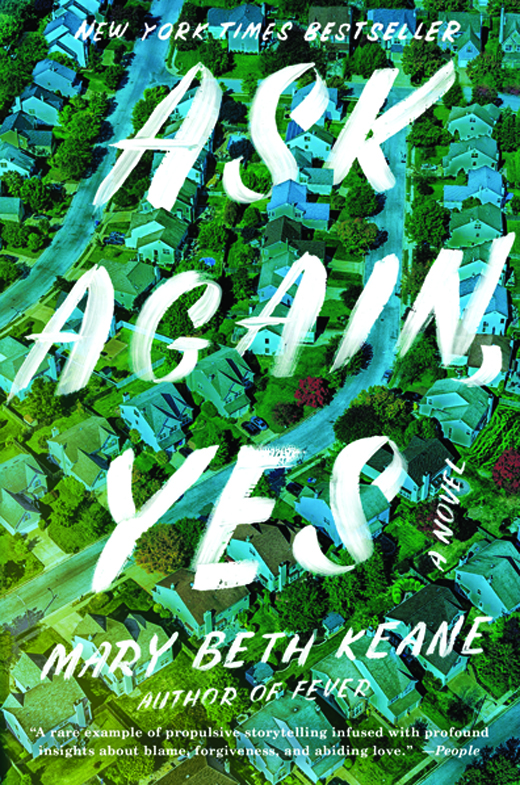
Ask Again, Yes
by Mary Beth Keane
With its almost Joycean title, the new novel from Mary Beth Keane (the author of Fever) starts slowly, almost melodically, saving the first of many sucker punches for a few chapters. Peter Stanhope and Kate Gleeson are childhood neighbours – both the offspring of NYPD cops, both the offspring of Irish immigrants (his mother; her father). They are good friends, and their fathers rub along reasonably well, although the odd behavior of Peter’s mother does not endear her to her neighbors (or indeed to many others). After one particularly disturbing incident, the Stanhopes leave the neighborhood and the friendship between the two kids comes to an abrupt
end. Keane keeps the action humming along nicely and the reader springs forward through the years, seeing all too vividly the way life progresses for Peter and Kate, and for their families. Ireland is a bit character throughout, never revisited, not often spoken about, but still playing an important role in the ways in which the characters take shape and are fleshed out. The twin demons of depression and alcoholism – obviously not unique to Ireland but carrying some weight in the national psyche – also come calling in this rich and beautiful novel. With Keane’s deft touch, characters are rendered as real as those you encounter in daily life, and it’s hard not
to think about them even after reading the last few pages. If we mentioned Keane’s Mayo roots (her mother hails from Louisburgh) you would think we were making it up!
– Darina Molloy
$27 / Simon & Schuster / 390 pages
℘℘℘
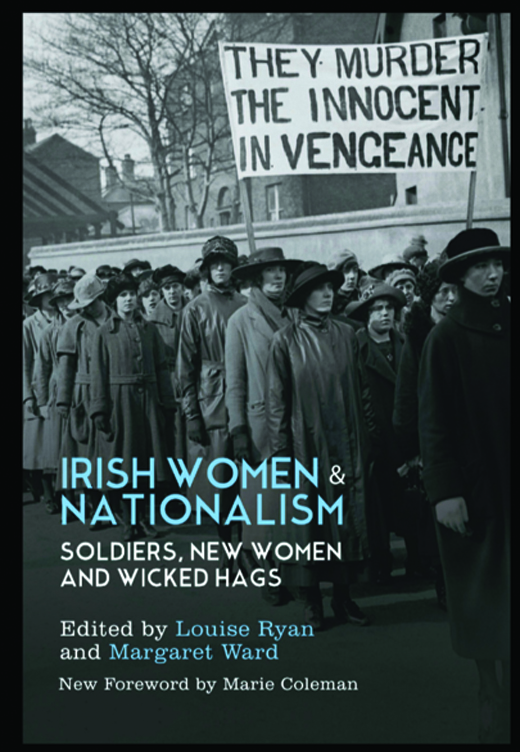
Irish Women & Nationalism: Soldiers, New Women and Wicked Hags
Edited by Louise Ryan and Margaret Ward
It’s quite revealing that one of the most prominent female nationalists in Irish history was born in London and bears the not-very-Irish name of Constance “Countess” Markievicz. She participated in the 1916 Easter Rising and was elected to a number of government positions in England and Ireland throughout the 1920s. But, alas, she is best remembered by the name of her husband, a Polish-born artist. (The “Countess” was actually born Constance Gore-Booth.) Irish Women & Nationalism goes a long way towards correcting this lopsided history, charting the pivotal role Irish women have played in various Irish liberation movements, from the Rising of 1641 right up to the Troubles in the north of Ireland in the late 20th century. After all, over two decades before David Trimble and John Hume won the Nobel Peace Prize “for their efforts to find a peaceful solution to the conflict in Northern Ireland,” Belfast natives Betty Williams Mairead Corrigan were awarded the prestigious honor, for their work with the group Community of Peace People.
– Tom Deignan
$25 / Irish Academic Press / 240 pages
℘℘℘
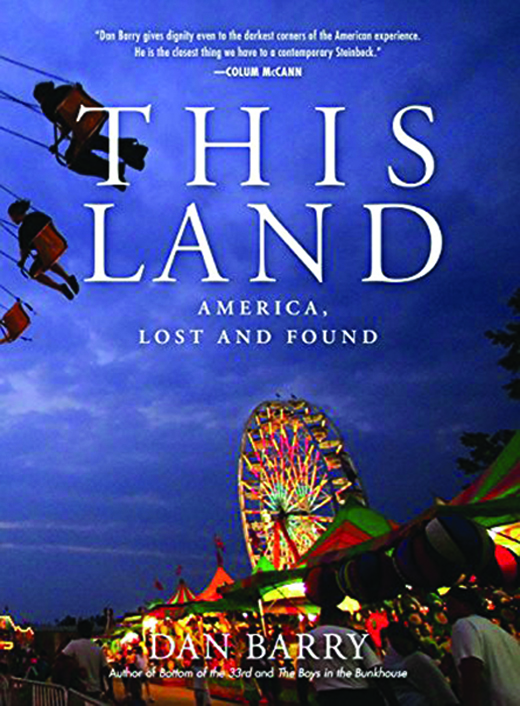
This Land: America, Lost and Found
By Dan Barry
For over a decade, Irish-American journalist Dan Barry has been filing dispatches from across America for a column in The New York Times entitled This Land. Now, many of Barry’s best have been collected in this handsome volume, which also includes plenty of gorgeous photography to complement Barry’s poetic work. From coal country to Manhattan’s Bowery,
from the front lines of the Great Recession to death row, This Land ultimately presents a portrait of a nation still filled with promise, but also plagued by no small amounts of anxiety and fear. In Barry’s hands, the joy, drama, and dignity of daily life shines through all the folks he writes about. It is impossible to pick a favorite here, but Barry’s lengthy report on Rhode Island “mobster” Ralph DeMasi – once shot by Irish gangster James Whitey” Bulger “several times in the drive-by killing of another target” – certainly stands out. But even the shorter pieces pack tremendous power – like a Springsteen song or Heaney poem. “The men and women I encountered were not numbers to be tallied in yet another political survey, they were individuals, trying to get through another day in America,” Barry writes in a touching introduction. “I witnessed their wills being tested by crime, by fate, by natural disaster. I watched them struggle and tumble, laugh and cry, pause to take a breath and whisper a prayer. To echo Faulkner, I saw them endure.”
– Tom Deignan
$29.99 / Black Dog & Leventhal / 391 pages
℘℘℘
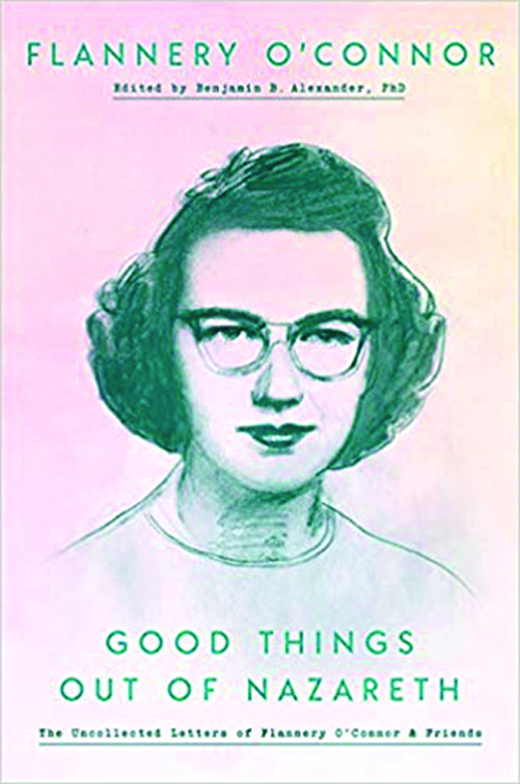
Good Things Out of Nazareth: The Uncollected Letters
of Flannery O’Connor & Friends Edited
by Benjamin B. Alexander
Flannery O’Connor remains one of the most fascinating and enigmatic writers in American letters, in part because she seems contradictory in so many ways. A southerner and a devout Catholic, Irish-American and thoroughly rural, she somehow managed to produce a deep, rich ouvre of short stories and novels, before dying at just 39 years old in March of 1964. Four decades after the important collection of O’Connor’s letters, The Habit of Being, was published, a new batch of correspondence arrives to give us fresh insights into O’Connor’s fiction. Edited by Benjamin B. Alexander, this new collection includes many posts to Irish-American Jesuit priest, James McCown, who (according to Alexander) “contributed to O’Connor’s creation of Ignatius Vogle, S.J., in her story ‘The Enduring Chill.’” In his preface, Alexander recalls attending a literary festival in Dublin held a few years back, to celebrate the life and work of 19th-century English poet (and Jesuit priest) Gerard Manley Hopkins. But following Alexander’s discussion about O’Connor, the Georgia-born writer “stole Hopkins’ thunder.” Irish “attendees were amazed that O’Connor was an amusing yet compelling apologist for the historical faith the cerebral James Joyce loathed.” Overall, these letters range from light-hearted to literary to downright gossipy, but overall they humanize this great artist to a fascinating degree. Perhaps
most interesting are the insights the letters provide into O’Connor as a reader. Though endlessly fascinated by religion, she also finds time to defend a young John Updike, whose early novel Rabbit, Run had been criticized for its frank sexuality. All in all this a fine companion volume to
The Habit of Being and, much more importantly, O’Connor’s novels and short stories.
– Tom Deignan
$26 / 372 pages / Convergent Books
♦

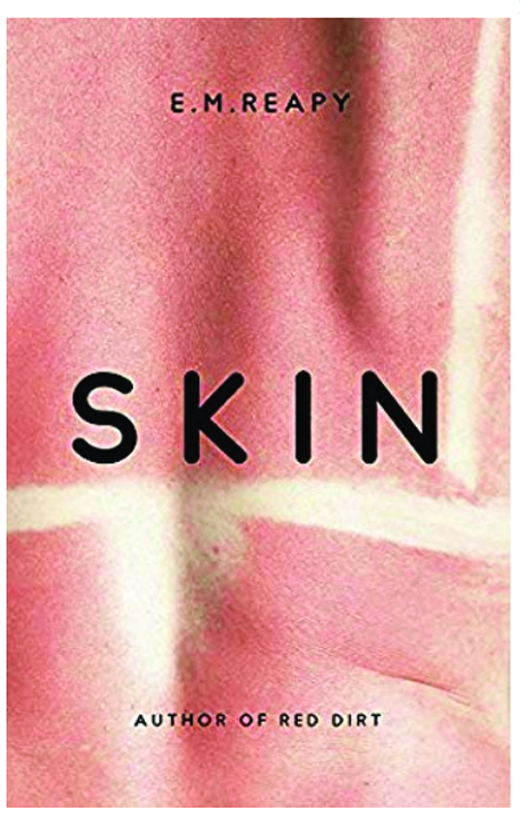
Leave a Reply